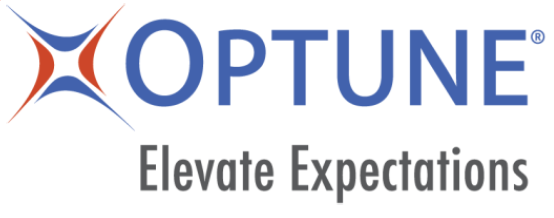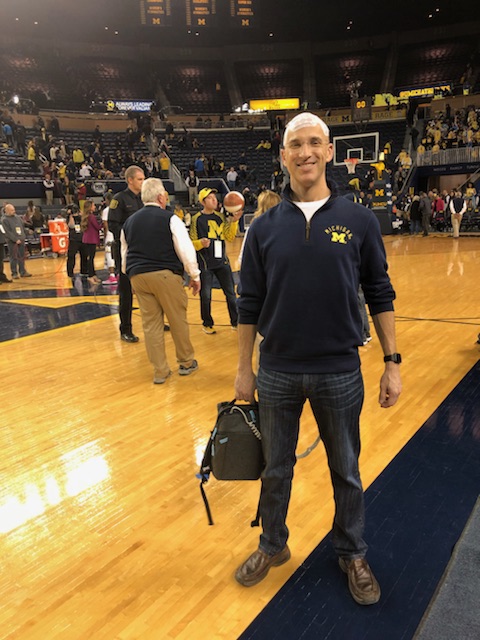Optune® Ambassador Program - Patient Story - Gill D.
September 20, 2019

Written by Optune® Ambassador Gill D.
Hi, everyone, my name is Gill. I’d like to take this opportunity to thank Novocure for making it possible for me to share my story with you today.
I’m a numbers guy. Statistics get me going. I like to keep track of things–dates, scores, results. When you’ve got a wicked brain cancer, an interest in compiling a thorough set of data can be very challenging. That’s where my faith comes in. Life with cancer was initially scary and sad, but it’s incredible now. Please remember, this is just my story, and your experience may be very different. I’d like to share with you today about some of the things that have helped get me through this cancer journey.
I’ve had good jobs since college, working in the pharmaceutical arena for over two decades. Ironically enough, for the past several years, I have either sold chemotherapy treatments or managed sales reps who sell chemo to oncologists! I encountered Optune years before I was ever diagnosed with glioblastoma (GBM), though I never got the opportunity to sell it. I remember being very interested in it. I love gadgets and technology.
Socially, I’ve always been pretty easygoing and carefree. Up until now, I haven’t faced any major life struggles. My wife Jennifer and I have been married for over two decades, and we have four amazing kids, three boys and a girl–all numbers I’m very pleased with.
Aside from family birthdays and our wedding anniversary, no other important dates or times stand out in my mind. Except for the summer I got cancer. I’d been dealing with a string of increasingly painful headaches that week. I had been chalking them up to sinus pressure headaches from fall allergies, something I’d experienced in the past.
Thursday, though–day four of my headaches, the pain became extremely severe. As I made my way to the bathroom that afternoon, I thought back to when I’d broken my arm a few years earlier. This pain was much worse than that! When it became so intense that my bladder involuntarily emptied onto the floor, I knew something was horribly wrong. I went to the ER.
My heart was ready to jump out of my chest as I was whisked quickly down the hall for a CT scan of my head. The waiting game that ensued was excruciating. The doctor eventually came in to tell me that there was a mass pressing on my brain that was bigger than a golf ball and that he wanted to do an MRI for further analysis. I couldn’t reach my wife by phone at the time. Was I on the verge of death? I had no idea.
When the oncologist came in after the MRI, he said that given the sudden onset of symptoms and the current size of the mass, he suspected that it was a grade 4 brain cancer–a glioblastoma–and that they should operate in two days. Wow! At that point, my mind was racing. I thought, Will I get brain damage from the surgery? and How long do I have to live?
I needed to do some research before I could move forward. I wanted to find the best surgeons in my area and learn about survival rates of patients with GBM. At home, I read on the internet that GBM is the worst and deadliest form of brain cancer, and that only about half of affected patients survive for more than a year. Those were numbers I did not like at all. But then I remembered that using a device on my head had the potential to extend that. I remembered Optune. That was a brilliant glimmer of hope for me! I thought if I could extend my chances of survival, who knew how many more drugs or devices I’d be eligible for in the future?
My family was very loving and supportive through this time. Late one night a few days before my surgery as I lay awake anguishing over my situation, it struck me that statistically my life would likely end very soon. I was suddenly confronted with the reality of my death–and my spiritual afterlife. Panicking, I realized that there were a few things I was still clinging to that didn’t align with my faith, bad habits that would jeopardize my afterlife. I wrested with that. I started to pray and vowed to God that I would be a changed and better man. For me to be able to move forward physically, it was critical that I first get my life in order spiritually. That night, I experienced a wonderful freedom and perfect peace that is with me to this day!
I had surgery a week after they found the mass, and the surgeons were able to remove most of it. My healthcare team and I later discussed solutions to control any further development of the tumor, and that’s when my doctor talked to me about Optune, a wearable, portable FDA-approved treatment for GBM in adult patients.

I did everything I could to try and get Optune. Waiting to hear if it was covered by my insurance drove me nuts, but I worked with the nCompass™ team to identify resources and minimize costs. Shortly thereafter, I was approved and ready to start treatment! Before beginning, I talked to my doctor who said the most common side effect with using Optune was mild to moderate skin irritation.
There was an adjustment period for me as I got used to the device. I needed to start sleeping on a different pillow so I could be more comfortable at night. Sometimes the arrays feel a little warm on my head–but they never get truly hot. At least, that’s the way it’s been for me. Others might experience something different.
My nCompass™ Device Support Specialists tracks my monthly usage rate. It is recommended that Optune be used for at least 75 percent of the time, or 18 hours a day, but I’m pretty competitive with my usage and I’m always trying to improve my usage rate. Using Optune gives me hope and helps me concentrate on the blessings in my life: fitness, holidays, and time with my wife and kids. With permission from my doctor, I am able to participate in some of the athletic activities I love. I’ve got some great pictures of me playing golf with my dad–with Optune sitting on the ground in the background! It is a portable treatment, which is so exciting!
Last year, I actually used Optune on a holy pilgrimage to France. A wonderful group whose main purpose is to serve the ill facilitates a once-a-year trip to Lourdes to visit the Grotto of Massabielle. After clearing it with my doctor, I filled out some forms and wrote a two-page essay on what the experience would mean to me, and I was chose–one of only 150 Americans! Another exciting number–what are the odds? Everything went smoothly during the trip; I even trained others traveling with me on how to apply my arrays. And Lourdes was amazing! I brought a ten-liter canteen with me and filled it at the natural spring where Mother Mary appeared to a local teenage girl in 1858. I’ve been giving out tiny glass bottles of the water ever since to people in need.
There are a lot of ways that Optune makes it easy for me to go about my life while receiving treatment. I’m glad I can still work–I did speak with my doctor after receiving my diagnosis, and we decided I could continue my normal employment and travel schedule while using Optune. Of course, this is just my experience. Yours may be different.
My tumor has been stable since surgery, and I’m so, so grateful for that!
I’ve chosen to use my position to support others. I aim to bring as much peace, hope, and optimism as I can into other cancer patients’ lives–because I understand how very uncertain, stressful, and tumultuous they can be.
Some of my friends and people I meet ask me how I can be so joyous when I have the worst type of brain cancer someone can have! I tell them it’s my new approach to life and God’s gift of perfect peace. Firstly, I no longer take for granted any of my countless blessings. And secondly, I have no anxiety about my health. I am thankful for my church family, who keep me in their prayers, and I only worry about the things I can control, like chemo, Optune, and my ketogenic diet. It probably sounds unbelievable, but I truly feel unbound and free, the happiest I’ve ever been in my life!
Thank you for letting me share my story with you today.
